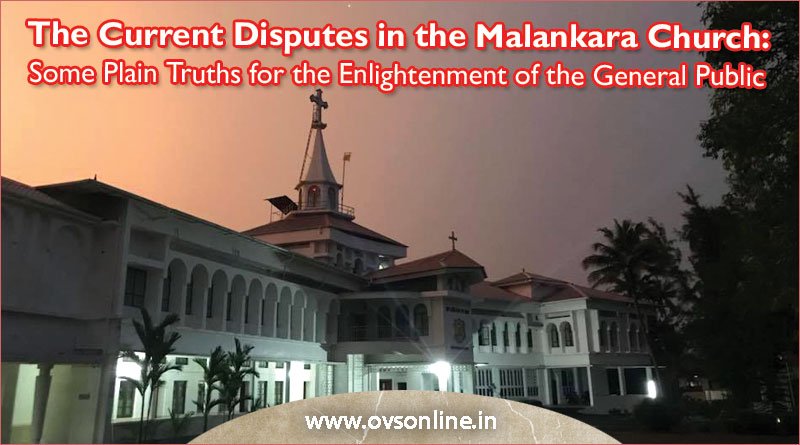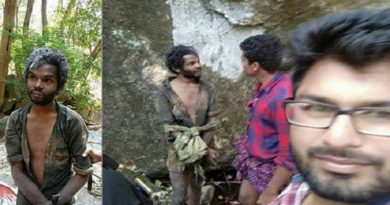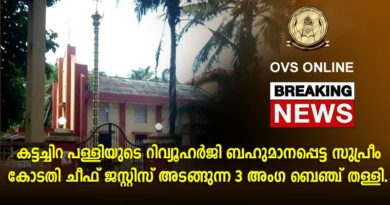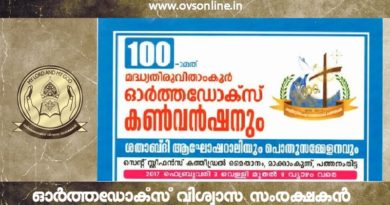The Current Disputes in the Malankara Church : Some Plain Truths for the Enlightenment of the General Public
The unfortunate division within the Malankara Orthodox Syrian Church has been continuing for a few decades now. The disputes have, at least in a few places, led to violent incidents negating Christian values. The Hon’ble Supreme Court of India, in July 2017, pronounced a verdict favouring the Orthodox Church. In unequivocal terms, the Apex Court has made it clear that the parishes in the Church must be administered in accordance with the 1934 Constitution of the Church and that no parallel administration shall be permitted. Thus the dissident faction in the Church who calls themselves ‘the Jacobite Church’ has lost all grounds. However, this faction which swears unconditional obedience to the Patriarch of Antioch is engaged in circulating a lot of untrue statements and gossip. Given below are a few points which reveal the truth behind the disputes for the enlightenment of the general public.
1. The alleged claim of the Jacobite faction that the Orthodox Church in India was founded only in 1912 whereas themselves are the true ancient Church is a grave factual error. Both factions equally share the common ancestral heritage of the first century St. Thomas Christians. In the 17th century, when the West Syriac (Antiochian) liturgical tradition was adopted here, there were no factions within the Church. The disputes began only in the beginning of the 20th century and they were based on certain administrative issues. In 1912, the Orthodox Church established its own independent Catholicate. This was only a milestone in the development of the Church and certainly not the formation of a new Church. In 1934, the Church framed its own Constitution and in 1958, the Supreme Court ratified it. After the Supreme Court verdict of 1958, the Church again reunited with both factions accepting the 1934 constitution and the Catholicate. Unfortunately in 1973-74, disputes began again. Clearly one group cannot claim that they alone hold on the “the ancient tradition.”
2. The appellation ‘Orthodox’ has been applied from the early centuries to Churches which uphold the true faith and Apostolic traditions. However, the title ‘Jacobites’ came to be used only from the 6th century onwards. In fact, it was a nickname, pejoratively used to refer to the followers of a Church Father named Jacob Baradaeus, Bishop of Edessa (543–578 A.D.). Most notably, the Antiochan Church doesn’t use this name and calls themselves ‘Syrian Orthodox Church’. The Jacobite faction in Malankara, by accepting the old nickname, is perhaps conceding that their church was founded only in the 6th century ! Also it is quite ironical that those who claim the legacy of St. Peter calls themselves ‘Jacobites’.
3. The Orthodox Church intends neither to capture any parish church nor to drive away the faithful therefrom. There are no difference in the faith and worshipping traditions of the two factions. All that the Orthodox Church intends is to bring all the faithful uniformly under a common administrative system in accordance with the 1934 Constitution as confirmed by the Apex Court of India.
4. As regards matters of faith, there are no differences between these factions which are both part of the Oriental Orthodox Communion. The alleged campaign of the Jacobite faction regarding differences in faith matters is only a trick to maintain a parallel administrative system which the Apex Court has totally discouraged.
5. Their arguments that only the ordinations made by the Patriarch are legitimate and only the Holy Chrism consecrated by the Patriarch is valid do not hold ground. During 1958-74, when there was peace in the Church, the Holy Chrism generally used in Malankara was not consecrated by the Patriarch. All the sacraments were performed here during this period of reunion. After the division began in 1973, no re-ordination or re-baptism was performed ! This is adequate proof to show that the faith and traditions have not been tampered with. The claims to the contrary are only deliberate ploys to undermine unity.
6. There is widespread criticism that the Orthodox Church is not willing for discussions and dialogues. After the division began in 1973-74, government and non-government agencies like YMCA arranged several platforms for unity talks in which the Orthodox Church wholeheartedly participated. However, there were no positive results because of the stubbornness on the opposite side’s part. In 2002, under the direction of the Hon’ble Supreme Court, a Malankara Association Meeting was conducted with Justice V. S. Malimath as the observer. The Jacobite faction had the golden opportunity to integrate themselves with the mainstream Church by ensuring the participation of the whole Church in the Association. But, in the last minute, they backed out from the Association meeting. Moreover, they convened another meeting at the same time, adopted a new constitution and thus declared themselves a new Church in 2002. Even now, they do not wish to respect the verdict of the Apex Court of India.
7. From the disputed parishes, including those of Piravom and Kothamangalam, the Orthodox priests and faithful were mercilessly driven out by the patriarchal faction when the conflicts began. In all those places, the faithful of the Orthodox Church underwent huge humiliations. Why the faction has gone for the court cases if they cannot respect the verdicts is a very relevant question. In 1995, the supreme court of India had asked both the factions whether they could resolve their disputes through an outside court settlement to which the Jacobite faction gave the assurance that they have full faith in the Court. And now, how could anyone justify their standpoint of non- acceptance of the court order?
8. It is true that the Orthodox Church does not agree on the partitioning of the Church properties. The Church has taken this position based on the fact that the Church is a Trust and the Trust properties cannot be divided and taken away by some of its members, on the basis of majority. The Court orders also well affirm this. For certain things, one may be able to take a decision in accordance with the majority, but that cannot be the case in all situations. For instance, in order to settle the Kashmir issue, a referendum cannot be accepted in the good interests of our country’s integrity. The 1934 Constitution certainly prioritizes majority. The election of Bishops and Church office bearers can be in accordance with the majority through vote, but the mode of administration cannot be decided through vote. The Vicar of the Parish cannot be elected by the people, but the Vicar will be appointed by the administrative head as per the Constitution. The management body elected with the Vicar as President can certainly manage the Parish. Nobody will be allowed to take away the properties or belongings of the parishes and none of the members will be forced to leave the Parish either.
9. Hence the argument that by accepting the 1934 Constitution, the properties and belongings will be taken away to the Catholicate Office in Kottayam is baseless and against truth.
10. The 1934 Constitution was repeatedly found valid by the Supreme Court verdicts of 1958, 1995 and 2017. In accordance with the Constitution, the administrative Head of the Malankara Church is His Holiness Baselios Marthoma Paulose II, Catholicos of the East and Malankara Metropolitan. The Constitution framed by the patriarchal faction in 2002 has been rejected by the Supreme Court of India.
11. The general public should seriously consider why the patriarchal faction is repeatedly losing their self–initiated Court cases. After the faction lost in 1958, the reunion was made on the condition that the Church and all the parishes should be governed in accordance with the 1934 Constitution. And when one forsakes the system prescribed by the Constitution and violates the 1958 Agreement, naturally they will lose the moral grounds of ownership too.
12. The fundamental rights defined by the Constitution of India grant the privilege and freedom for any citizen to follow any religion or any ritual. For that purpose, anybody can find places of worship. Nobody will ever stand against it, but the dispute in question is over the 1064 parishes where the administration shall be carried out in accordance with the 1934 constitution. It is this truth that has been reaffirmed by the apex Court of India.
13. It is baseless to argue that the Malankara Orthodox Church does not respect the Patriarch of Antioch. The church is always willing to honour and respect the position of the Patriarch as defined in the 1934 Constitution. The Church has never taken away the name of the Patriarch from the prayers of the Holy Eucharistic service.
14. There is no parallel in modern times for the trials and tribulations the Orthodox Church underwent in order to maintain its stand regarding one united Church and one administration. Though several priests and faithful have been brutally attacked and put to indescribable difficulties, we have only sought justice from the civil courts rather than resorting to open fights. The Orthodox Church has always striven to maintain its dignity and spirit of forgiveness. We only wish that the law of the land should prevail and the directions of the Apex court should be accepted by all law–abiding citizens of India.
Public Relations Department
Malankara Orthodox Syrian Church
Devalokam, Kottayam, Kerala
| മലങ്കര സഭാ ന്യൂസ് Android Application → OVS Online ഇല് നിന്നുമുള്ള വാര്ത്തകളും ലേഖനങ്ങളും നിങ്ങളുടെ മൊബൈലില് ഉടന് തന്നെ ലഭ്യമാകുവാന് ഞങ്ങളുടെ Android Application ഇന്സ്റ്റോള് ചെയ്തോളൂ |




